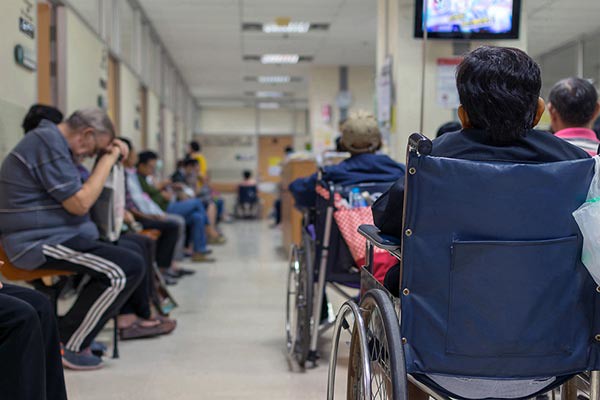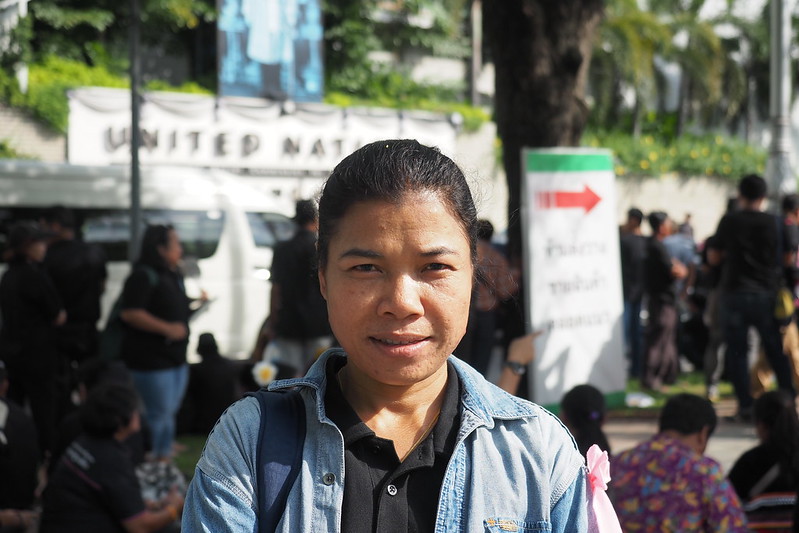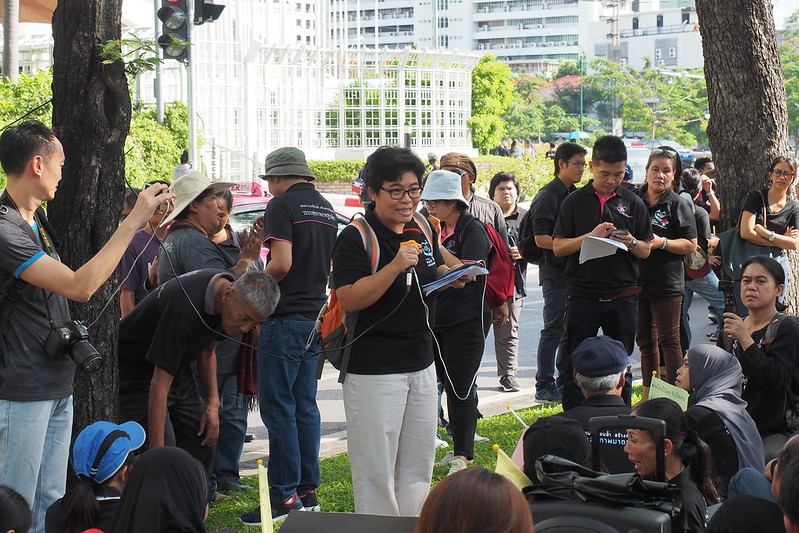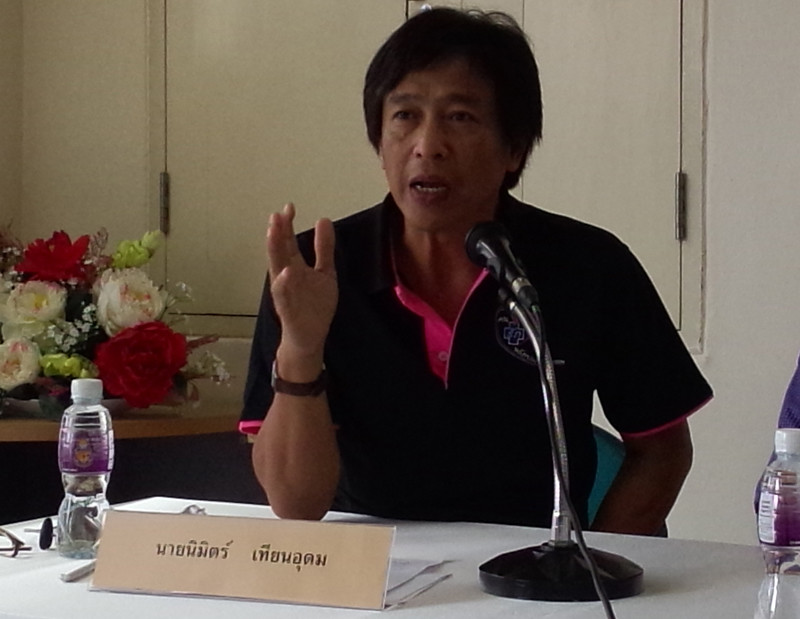While taking credit internationally for the country’s healthcare scheme, the Thai junta has begun the process of amending the law which could put at risk the health of millions of Thais who rely on public health coverage.

A common everyday scene of public hospitals in Thailand (photo from Kapook.com)
“It might be more difficult for people like us to get medical treatment if the [2002 National Health Security] Act is amended because we might have to pay for costly medical bills for the rest of our lives,” said Tanutkan Thanatomonthanusiri from the Thai Network of People Living with HIV/AIDS (Northeast).
About three years after Gen Prayuth Chan-o-cha, the junta leader and Prime Minister, hinted of a plan to introduce co-payments into the national healthcare scheme, Piyasakol Sakolsatayadorn, Public Health Minister, set up a committee on 9 January 2017 to reform the National Health Security Act, which will directly affect the functions of the National Health Security Office (NHSO).
The committee was quickly formed after the junta-appointed National Legislative Assembly (NLA) proposed the amendment on the grounds that the change will improve the efficiency and sustainability of the national healthcare system. However, many civil society organisations have pointed out that the amendment will only put at risk the lives of the country’s most vulnerable people.

Tanutkan Thanatomonthanusiri from the Thai Network of People Living with HIV/AIDS (Northeast)
Access to life-saving medicines at risk
“For an HIV patient like me, obtaining essential medicines is very important,” Tanutkan told Prachatai at the rally led by the People's Health Systems Movement (PHSM) against the amendment to the National Health Security Act in Bangkok on 6 June 2017. She added that there is no guarantee that important medicines will still be provided to the people under the public universal healthcare system.
According to Kannikar Kijtiwatchakul from FTA Watch, the NHSO has, since its establishment, been active in buying medicines in bulk for patients with cancer, HIV, kidney disease, and those suffering from other chronic illnesses nationwide through a central procurement system.
“The NHSO’s medical procurement system reduces the cost of drugs by about 50-80 per cent, making it possible for people under universal healthcare to access treatment. Through the central procurement system, the NHSO can lower the price of Docetaxel (for treating breast cancer) from 30,000 to 4,000 baht per injection,” Kannika told Prachatai.

Kannikar Kijtiwatchakul speaking at the People's Health Systems Movement (PHSM)’s protest in front of the office of the United Nations in Bangkok on 6 June 2017 to demand the junta to cease efforts in amending the National Health Security Act
She added that although the NHSO helps the nation save about 7 billion baht in the annual public health budget, the new bill does not acknowledge the role of the NHSO in procuring medicines. On the contrary, the PHSM points out that the new bill seems to restore the authority to buy medicines to the Public Health Ministry, similar to the procurement system before the enactment of the 2002 National Health Security Act.
In the past, the Public Health Ministry usually procured the 10 most common drugs for the majority of patients while patented drugs for patients with chronic diseases were left off the procurement list. So if the NHSO’s role in procuring medicines is to be restricted under the amendment, costly medicines for treating diseases such as cancer and HIV or snake-bite serums might become less accessible.
Lack of public participation and oversight
In the committee set up to amend the National Health Insurance Act, only two seats out of 26 were given to representatives of civil society groups while the rest are for representatives of medical professional associations and officials selected by the Public Health Ministry. Civil society groups called on the Ministry to increase their representation on the committee, but the authorities ignored their demand.
According to the PHSM, one of the committee’s proposals is to change the composition of the NHSO board by allocating more seats to medical professional associations and Public Health Ministry officials, while retaining the same number of seats for civil society groups, but reducing the number of regional representatives.
Nimit Tienudom, Director of Aids Access Foundation (AAF), told the media “if authority is being shifted back to the Public Health Ministry, we can expect that the first thing that will be destroyed is the role of the people’s sector and the right of the people to look after and manage their own health.”

Nimit Tienudom, Director of Aids Access Foundation (AAF) (file photo)
He warned that the change in the composition of the NHSO board could upset the checks and balance system of the national health insurance system as service providers will have more power over consumer representatives.
The AAF Director added that the new bill also restricts the NHSO in providing financial support to civil society and community-based health organisations for disease prevention activities, which is in the long run is less costly than providing medical treatment.
The PHSM pointed out that although the committee reviewing the amendment promised that regional forums would be held in June to survey opinions about the amendment process, most of the proposals have already been agreed by the committee and the authorities have not done enough to promote the forums or provide support for people who would like to participate in them.
Sureerat Treemanka of the People's Health Systems Movement, one of the two civil society representatives on the amendment committee told the media that the amendment process had no integrity from the beginning because it was already stitched up from the start.
Prachatai English is an independent, non-profit news outlet committed to covering underreported issues in Thailand, especially about democratization and human rights, despite pressure from the authorities. Your support will ensure that we stay a professional media source and be able to meet the challenges and deliver in-depth reporting.
• Simple steps to support Prachatai English
1. Bank transfer to account “โครงการหนังสือพิมพ์อินเทอร์เน็ต ประชาไท” or “Prachatai Online Newspaper” 091-0-21689-4, Krungthai Bank
2. Or, Transfer money via Paypal, to e-mail address: [email protected], please leave a comment on the transaction as “For Prachatai English”
